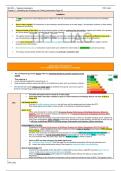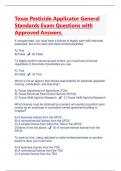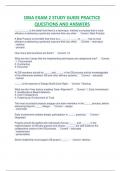RE WS1 – Tasking Instructions TIFF LIAO
Chapter 8 – Marketing the Property and Taking Instructions Page 95
SUMMARY
An EPC is required for most buildings sold or rented out in the UK, and should be obtained by the SELLER as soon as marketing
begins.
Once a sale is agreed, full instructions on the transaction should be taken at an early stage + documentary evidence of client identity
obtained by the solicitor.
Personal details of the client (and other relevant parties) should be confirmed by the solicitor, together with details of the property
and terms agreed for the sale (including the amount of any deposit).
The solicitor should advise on the cost of the transaction and carry out a financial calculation to check that sufficient funds exist to
pay off outstanding mortgages ( in the caser of the seller) of to complete the purchase (in the case of the transaction).
In the case of the sale, the need for a mortgage, survey and insurance should be discussed by the solicitor, together with the
proposed use of the property.
In residential transactions, instructions must be taken as to whether the client needs to synchronise a sale and purchase.
The solicitor should identify whether the client requires any particular completion date.
MARKETING THE PROPERTY:
EPC & MINIMUM ENERGY EFFICIENCY STANDARD
The conveyancing process begins when an individual decides to put their property on the
market.
This might be a:
private individual selling their current home, or
large developer selling a newly-built office to an institutional investor such as a pension company.
The SELLER will usually employ an estate agent to advertise the property, and once a buyer is
found the conveyancing process proper can begin.
The seller will need to have in hand at an early stage.
From April 2018 it has been unlawful to grant or renew tenancies of buildings that do not have at least a
rating of E
EPC OBTAINED WHERE?
- From an accredited energy assessor, who will carry out the assessment and produce the EPC.
- Most estate agents will be able to assist a seller in contacting an appropriate assessor.
WHAT IS IT?
- EPCs were introduced to comply with the European Energy Performance of Buildings Directive (Directive
2002/91), which has now been revoked and replaced by the Energy Performance of Buildings Directive 2010
(EPB Directive 2010/31/EU).
- Nearly 40% of the UK’s energy consumption arises from the way in which our 25 million buildings are lit, heated and
used. Even comparatively minor changes in the energy performance of each building, and the way in which we use
it, will have a significant effect in reducing energy consumption and therefore carbon emissions.
REQUIREMENTS FOR EPC
- Contained in the Energy Performance of Buildings (England and Wales) Regulations 2012 (SI 2012/3118).
- These require, where a building is to be sold or rented out, that the seller or landlord must make an EPC available
free of charge at the earliest opportunity.
- The EPC must have been commissioned (even though not received) before the property can be marketed and
there is an obligation to use all reasonable efforts to ensure that it is received within 7 days of marketing.
- If it is not received within the seven days, there is a further 21 days in which to obtain it.
- Once an EPC has been received, the estate agent must:
(a) provide a copy of the EPC (the first page only for residential properties) with the sale particulars and
(b) ensure the energy performance rating of the property is contained within any advertising.
WHO’S RESPONSIBILITY?
- It remains the responsibility of the SELLER or LANDLORD to ensure that a valid EPC has been given, free of
charge, to the person who becomes the buyer or tenant.
- There are financial penalties (enforceable by Trading Standards Officers) for failing to comply with the
Regulations.
- Nearly all buildings in the UK that are constructed, sold or rented out will have to have an EPC. This applies to both
1
TIFF LIAO
, RE WS1 – Tasking Instructions TIFF LIAO
Chapter 8 – Marketing the Property and Taking Instructions Page 95
commercial and residential property. There are exceptions, amongst others, for buildings about to be demolished.
- The Regulations also impose obligations for air-conditioning systems exceeding stated power outputs to be
subject to an energy assessment every 5 years, and for the inspection reports to be lodged with the central EPC
register.
EPCs are issued by specially qualified inspectors.
- The EPC contains an indicator of the amount of energy estimated to be needed for the standard use of the
building. This ‘asset rating’ is expressed as a number and on a graph with coloured bands labelled A to G (A being
the most energy efficient).
- The EPC also contains:
certain recommendations for improving the energy performance of the building,
together with the potential ratings which might be achieved for the building if all the recommendations were
implemented.
- The EPC will also disclose to the buyer the existence of a Green Deal plan.
WHAT IS IT?
- The Green Deal was launched in January 2013 and is a government initiative that enables property owners and
tenants to carry out a range of energy efficiency measures with NO upfront cost.
GREEN DEAL
- The finance is provided by Green Deal providers (private companies, charities and local authorities) and the
repayments are spread over a period of up to 25 years through a separate charge added to the property owner’s
electricity bill.
SELLER TO BUYER
- The charge (which should not be more than the estimated energy bill savings) is payable by the occupier from time
to time, so on a sale and purchase it will transfer to the BUYER.
- The SELLER is therefore obliged to provide prospective buyers with an EPC containing the required Green Deal
plan information and ensure that the contract for sale includes an acknowledgement by the buyer that the bill
payer at the property is obliged to make payments under the Green Deal plan
SELLER FAILS TO DISCLOSE
- … the existence of a Green Deal plan or obtain the necessary acknowledgment from the buyer, the Secretary of
State may (but is not obliged to)
(a) cancel the liability of the buyer to make payments under the Green Deal plan and
(b) may require the seller to pay compensation (which in most cases would equate to the amount outstanding on
the Green Deal plan less a discount for early settlement).
- The seller’s solicitor should therefore ensure that they inspect the EPC before drafting the contract, so that any
required acknowledgment can be inserted into the contract for sale.
- If the information is contained on a disclosed EPC (even if it has not been acknowledged by the buyer in the
contract), there is a risk that the Secretary of State may decline to cancel the obligation to pay the charge.
- It should be noted that the duty of disclosure and acknowledgement also applies to a landlord on the letting of a
property, if the occupier is to pay the energy bills.
From April 2018, landlords of certain domestic or non-domestic buildings CANNOT lawfully grant new tenancies or renew
existing tenancies if the building DOES NOT MEET the minimum energy efficiency standard (MEES), which is EPC rating E.
WHAT IS MEES?
- introduced by the Energy Efficiency (Private Rented Property) (England and Wales) Regulations 2015 (SI
2015/ 962) (the MEES Regulations), which also provide that:
MINIMUM
(a) a landlord cannot continue to let a domestic privately rented (PR) property on or after 1 April 2020, or
ENERGY
(b) a non-domestic PR property on or after 1 April 2023,
EFFICIENCY
(c) unless the property complies with MEES.
STANDARD
A domestic PR property =, a property let under an assured, regulated or agricultural tenancy, but certain tenancies
are excluded, such as those not required to have an EPC.
A non- domestic PR property = a building which is NOT A DWELLING and is let under a tenancy in England and
Wales, although certain properties are excluded, such as those not required to have an EPC and those let on
tenancies of less than six months or over 99 years.
- A landlord who wishes to let a ‘sub-standard’ property where the valid EPC is F or G rated - will have to undertake
‘relevant energy efficiency improvements’ that improve efficiency in the use of energy in the property and which
are listed in the Schedule to the Green Deal (Qualifying Energy Improvements) Order 2012 (SI 2012/2105),
UNLESS the landlord has obtained an opinion that the improvement will have a negative
impact on the fabric or structure of the property.
EXEMPTIONS
- (Part 3) for a landlord who has tried to increase the EPC to band E but failed because:
(a) the tenant’s consent has not been forthcoming, or
(b) who has obtained a report from a surveyor stating that making the relevant energy efficiency improvement
would result in a reduction of more than 5% in the market value of the property
= Landlords will also be able to obtain a temporary exemption for six months in certain circumstances.
2
TIFF LIAO
Chapter 8 – Marketing the Property and Taking Instructions Page 95
SUMMARY
An EPC is required for most buildings sold or rented out in the UK, and should be obtained by the SELLER as soon as marketing
begins.
Once a sale is agreed, full instructions on the transaction should be taken at an early stage + documentary evidence of client identity
obtained by the solicitor.
Personal details of the client (and other relevant parties) should be confirmed by the solicitor, together with details of the property
and terms agreed for the sale (including the amount of any deposit).
The solicitor should advise on the cost of the transaction and carry out a financial calculation to check that sufficient funds exist to
pay off outstanding mortgages ( in the caser of the seller) of to complete the purchase (in the case of the transaction).
In the case of the sale, the need for a mortgage, survey and insurance should be discussed by the solicitor, together with the
proposed use of the property.
In residential transactions, instructions must be taken as to whether the client needs to synchronise a sale and purchase.
The solicitor should identify whether the client requires any particular completion date.
MARKETING THE PROPERTY:
EPC & MINIMUM ENERGY EFFICIENCY STANDARD
The conveyancing process begins when an individual decides to put their property on the
market.
This might be a:
private individual selling their current home, or
large developer selling a newly-built office to an institutional investor such as a pension company.
The SELLER will usually employ an estate agent to advertise the property, and once a buyer is
found the conveyancing process proper can begin.
The seller will need to have in hand at an early stage.
From April 2018 it has been unlawful to grant or renew tenancies of buildings that do not have at least a
rating of E
EPC OBTAINED WHERE?
- From an accredited energy assessor, who will carry out the assessment and produce the EPC.
- Most estate agents will be able to assist a seller in contacting an appropriate assessor.
WHAT IS IT?
- EPCs were introduced to comply with the European Energy Performance of Buildings Directive (Directive
2002/91), which has now been revoked and replaced by the Energy Performance of Buildings Directive 2010
(EPB Directive 2010/31/EU).
- Nearly 40% of the UK’s energy consumption arises from the way in which our 25 million buildings are lit, heated and
used. Even comparatively minor changes in the energy performance of each building, and the way in which we use
it, will have a significant effect in reducing energy consumption and therefore carbon emissions.
REQUIREMENTS FOR EPC
- Contained in the Energy Performance of Buildings (England and Wales) Regulations 2012 (SI 2012/3118).
- These require, where a building is to be sold or rented out, that the seller or landlord must make an EPC available
free of charge at the earliest opportunity.
- The EPC must have been commissioned (even though not received) before the property can be marketed and
there is an obligation to use all reasonable efforts to ensure that it is received within 7 days of marketing.
- If it is not received within the seven days, there is a further 21 days in which to obtain it.
- Once an EPC has been received, the estate agent must:
(a) provide a copy of the EPC (the first page only for residential properties) with the sale particulars and
(b) ensure the energy performance rating of the property is contained within any advertising.
WHO’S RESPONSIBILITY?
- It remains the responsibility of the SELLER or LANDLORD to ensure that a valid EPC has been given, free of
charge, to the person who becomes the buyer or tenant.
- There are financial penalties (enforceable by Trading Standards Officers) for failing to comply with the
Regulations.
- Nearly all buildings in the UK that are constructed, sold or rented out will have to have an EPC. This applies to both
1
TIFF LIAO
, RE WS1 – Tasking Instructions TIFF LIAO
Chapter 8 – Marketing the Property and Taking Instructions Page 95
commercial and residential property. There are exceptions, amongst others, for buildings about to be demolished.
- The Regulations also impose obligations for air-conditioning systems exceeding stated power outputs to be
subject to an energy assessment every 5 years, and for the inspection reports to be lodged with the central EPC
register.
EPCs are issued by specially qualified inspectors.
- The EPC contains an indicator of the amount of energy estimated to be needed for the standard use of the
building. This ‘asset rating’ is expressed as a number and on a graph with coloured bands labelled A to G (A being
the most energy efficient).
- The EPC also contains:
certain recommendations for improving the energy performance of the building,
together with the potential ratings which might be achieved for the building if all the recommendations were
implemented.
- The EPC will also disclose to the buyer the existence of a Green Deal plan.
WHAT IS IT?
- The Green Deal was launched in January 2013 and is a government initiative that enables property owners and
tenants to carry out a range of energy efficiency measures with NO upfront cost.
GREEN DEAL
- The finance is provided by Green Deal providers (private companies, charities and local authorities) and the
repayments are spread over a period of up to 25 years through a separate charge added to the property owner’s
electricity bill.
SELLER TO BUYER
- The charge (which should not be more than the estimated energy bill savings) is payable by the occupier from time
to time, so on a sale and purchase it will transfer to the BUYER.
- The SELLER is therefore obliged to provide prospective buyers with an EPC containing the required Green Deal
plan information and ensure that the contract for sale includes an acknowledgement by the buyer that the bill
payer at the property is obliged to make payments under the Green Deal plan
SELLER FAILS TO DISCLOSE
- … the existence of a Green Deal plan or obtain the necessary acknowledgment from the buyer, the Secretary of
State may (but is not obliged to)
(a) cancel the liability of the buyer to make payments under the Green Deal plan and
(b) may require the seller to pay compensation (which in most cases would equate to the amount outstanding on
the Green Deal plan less a discount for early settlement).
- The seller’s solicitor should therefore ensure that they inspect the EPC before drafting the contract, so that any
required acknowledgment can be inserted into the contract for sale.
- If the information is contained on a disclosed EPC (even if it has not been acknowledged by the buyer in the
contract), there is a risk that the Secretary of State may decline to cancel the obligation to pay the charge.
- It should be noted that the duty of disclosure and acknowledgement also applies to a landlord on the letting of a
property, if the occupier is to pay the energy bills.
From April 2018, landlords of certain domestic or non-domestic buildings CANNOT lawfully grant new tenancies or renew
existing tenancies if the building DOES NOT MEET the minimum energy efficiency standard (MEES), which is EPC rating E.
WHAT IS MEES?
- introduced by the Energy Efficiency (Private Rented Property) (England and Wales) Regulations 2015 (SI
2015/ 962) (the MEES Regulations), which also provide that:
MINIMUM
(a) a landlord cannot continue to let a domestic privately rented (PR) property on or after 1 April 2020, or
ENERGY
(b) a non-domestic PR property on or after 1 April 2023,
EFFICIENCY
(c) unless the property complies with MEES.
STANDARD
A domestic PR property =, a property let under an assured, regulated or agricultural tenancy, but certain tenancies
are excluded, such as those not required to have an EPC.
A non- domestic PR property = a building which is NOT A DWELLING and is let under a tenancy in England and
Wales, although certain properties are excluded, such as those not required to have an EPC and those let on
tenancies of less than six months or over 99 years.
- A landlord who wishes to let a ‘sub-standard’ property where the valid EPC is F or G rated - will have to undertake
‘relevant energy efficiency improvements’ that improve efficiency in the use of energy in the property and which
are listed in the Schedule to the Green Deal (Qualifying Energy Improvements) Order 2012 (SI 2012/2105),
UNLESS the landlord has obtained an opinion that the improvement will have a negative
impact on the fabric or structure of the property.
EXEMPTIONS
- (Part 3) for a landlord who has tried to increase the EPC to band E but failed because:
(a) the tenant’s consent has not been forthcoming, or
(b) who has obtained a report from a surveyor stating that making the relevant energy efficiency improvement
would result in a reduction of more than 5% in the market value of the property
= Landlords will also be able to obtain a temporary exemption for six months in certain circumstances.
2
TIFF LIAO





















